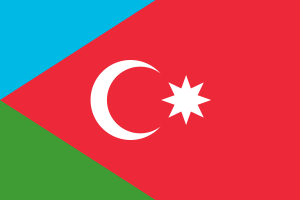Language/South-azerbaijani/Grammar/Comparatives-and-Superlatives
Comparatives and superlatives are essential grammatical concepts that allow speakers to express comparisons between two or more people, things, or actions. In this lesson, you will learn how to use comparatives and superlatives in South Azerbaijani to describe and compare different entities.
Comparatives
Comparatives are used when comparing two entities. In English, they are usually formed by adding "-er" to the adjective or using the construction "more + adjective." The same principle applies in South Azerbaijani.
For example:
| South Azerbaijani | Pronunciation | English |
|---|---|---|
| سفید | sefid | white |
| سفیدتر | sefidtar | whiter |
| لرزین | lorzin | smooth |
| لرزینتر | lorzintar | smoother |
As you can see in the example above, to form the comparative, the adjective is modified by adding "-tar". It is essential to note that suffix "-tar" concords with the gender and number of the noun that it modifies.
Another way of forming the comparative in South Azerbaijani is to use the particle "داها" /daːhɑ/, which is equivalent to "more." The same method can be applied to form comparatives for adjectives that do not end in with "-tar."
For example:
| South Azerbaijani | Pronunciation | English |
|---|---|---|
| خروش | xoroş | loud |
| داها خروش | daːhɑ xoroş | more loud |
Superlatives
In English, superlatives are formed by adding "-est" to the adjective or by using the construction "most + adjective." The same principle applies in South Azerbaijani.
To form the superlative, use the particle "ترین" /tæɾin/. It is essential to note that suffix "-tariŋ"oncords with the gender and number of the noun that it modifies.
For example:
| South Azerbaijani | Pronunciation | English |
|---|---|---|
| سپید | sepid | white |
| سپیدترین | sepidtariŋ | the whitest |
| سفت | soft | soft |
| سفتترین | softtariŋ | the softest |
As you can see in the example above, both the comparative and the superlative are formed by modifying the adjective with specific suffixes that depend on the noun that it modifies.
Irregular Forms
Some adjectives have an irregular comparative or superlative form. Here are some examples:
| South Azerbaijani | Pronunciation | English |
|---|---|---|
| خوب | xo:b | good |
| بهتر | behetar | better |
| بهترین | behetarin | the best |
| بد | bæd | bad |
| بدتر | bædtar | worse |
| بدترین | bædtarin | the worst |
As you can see in the example above, the adjectives "خوب" /xo:b/ and "بد" /bæd/ have an irregular comparative and superlative form. The comparative of "خوب" /xo:b/ is "بهتر" /behetar/ (better), and the superlative is "بهترین" /behetarin/ (the best). For "بد" /bæd/, the comparative is "بدتر" /bædtar/ (worse), and the superlative is "بدترین" /bædtarin/ (the worst).
Another example of irregular forms is the word for "many." Instead of using a comparative form, speakers use the word "كؤچك" /kʊtʃæk/ (small) to describe fewer items and the word "بیشتر" /biːʃtæɾ/ (more) to describe a larger number of items.
| South Azerbaijani | Pronunciation | English |
|---|---|---|
| كؤچك | kʊtʃæk | small |
| بیشتر | biːʃtæɾ | more |
As you can see in the example above, instead of using a comparative form for "many," speakers of South Azerbaijani use adjectives that describe size to convey the difference in the number of items.
Practice
- Translate the following sentences into South Azerbaijani using the comparative form:
- She is taller than her sister.
- The red dress is prettier than the blue one.
- The book is more interesting than the movie.
- Translate the following sentences into South Azerbaijani using the superlative form:
- This is the best restaurant in town.
- The smartest student in the class is John.
- The most delicious food in the world is pizza.
Conclusion
In this lesson, you have learned how to form the comparative and superlative in South Azerbaijani. You have also learned about irregular forms for some adjectives. Using comparatives and superlatives, you can express different levels of comparison and describe people, things, or actions. Practice forming comparatives and superlatives and try to use them in everyday conversation to improve your South Azerbaijani language skills.

